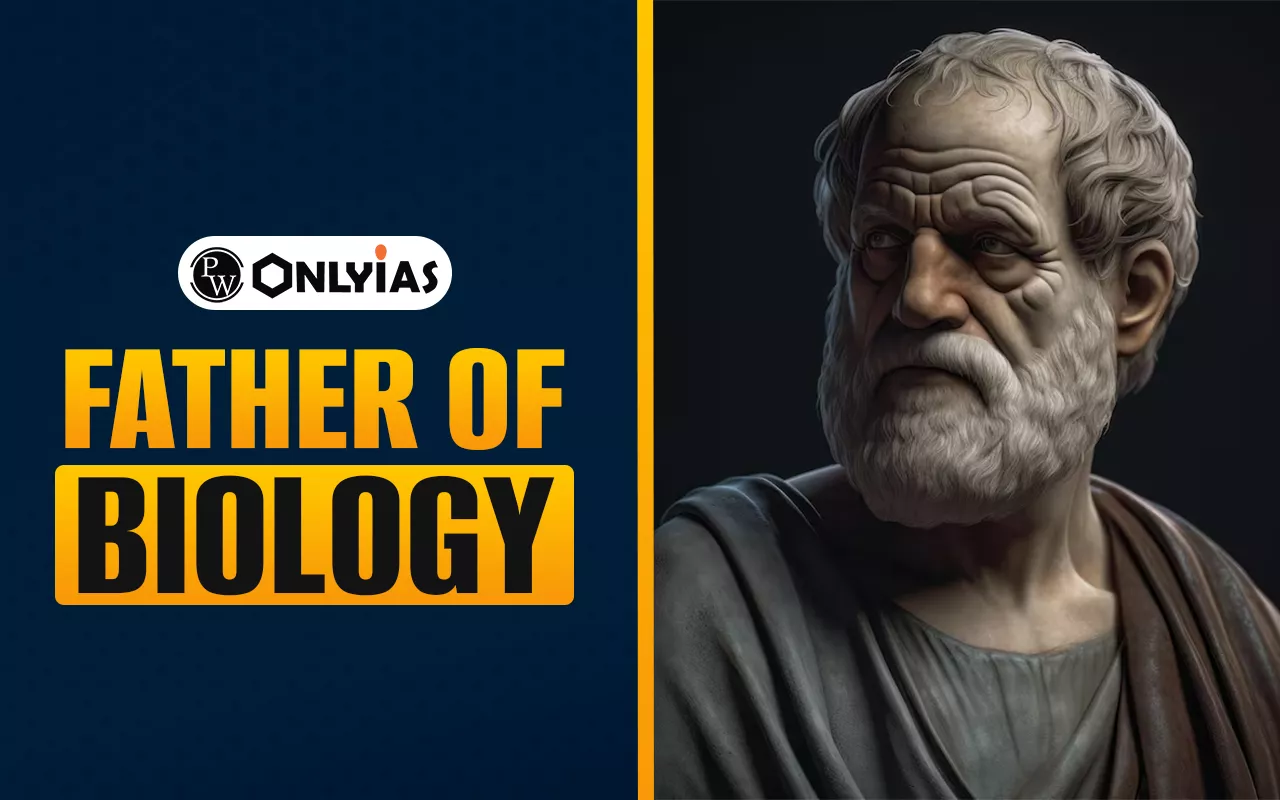The Father of Biology, Aristotle (384–322 BCE), was the first to systematically study and classify living things. He described over 500 species and laid the foundation for zoology and botany. In India, Sir Jagadish Chandra Bose is regarded as the Father of Biology for his plant research.

Father of Biology: Aristotle, a Greek philosopher born in 384 BCE, is considered the father of biology. He was called the father of biology due to the fact that he was the first one to study living things carefully and classify animals based on their features. Aristotle described over 500 species and explored how animals grow, reproduce, and behave. His work helped start biology as a scientific study.
Aristotle’s observations laid the foundation for biology and zoology. He divided blood-containing animals, such as mammals, from bloodless ones, like insects. Apart from Aristotle, Sir Jagadish Chandra Bose is also referred to as the father of biology in India because of his research on plants. Even today, much of how we learn about life remains influenced by Aristotle’s ideas.
The Greek philosopher Aristotle is often referred to as the “father of biology.” He lived from about 384 to 322 BCE and is considered to have established many of the concepts that would underpin biology.
Aristotle gave structure to the study of living organisms by analyzing their features and classifying them in ways that have endured in modern biology. Many people regard him as the most important early thinker about life and animals.
Aristotle is credited with numerous discoveries in science. He observed that animals can be categorized according to their various features, like blood type, movement, and habitat. He developed one of the first classification systems.
Over 500 species were described by him. Aristotle’s works on reproduction, growth, and parts of animals helped subsequent generations of scientists to understand life better. Here are details of some of the key contributions of Aristotle :
| Major Discoveries by Aristotle in Biology | |
| Contribution | Description |
| Animal Classification | Grouped animals based on shared features |
| Study of Reproduction | First detailed observations of animal reproduction |
| Observation of Growth | Explained how living things develop and grow |
| Behavioral Studies | Noted how animals behave in different environments |
While Aristotle is the father of biology, others also contributed much to the field. Theophrastus, being his student, is considered the father of botany because he studied plants in detail.
Carl Linnaeus, a later scientist, organized plants and animals into a formal system called binomial nomenclature. Gregor Mendel is known as the father of genetics for discovering how traits are passed down. It is from these pioneers that biology thrived as a full science.
He is considered one of the most important personalities in biology in India. He discovered many things about plants and how they react to certain factors. Bose proved that plants react much like other living forms, like animals.
Bose brought biology into mainstream science in India. Consequently, he is regarded as the father of biology in India due to his immense research and inventions.
Check Out UPSC CSE Books
Visit PW Store
Biology has many branches, and some scientists are called fathers of these branches:
|
Fathers of Other Biological Branches |
|
| Branch | Father |
| Biology | Aristotle |
| Botany (Plants) | Theophrastus |
| Zoology (Animals) | Aristotle |
| Genetics | Gregor Mendel |
For many centuries, biology had been influenced by the ideas of Aristotle. Nowadays, it is his approach to observing and classifying life that helps scientists learn from nature. While many of the modern methods have improved upon his work, Aristotle’s role as the father of biology is clear. His studies had set a path for scientific discovery and a deeper understanding of life on Earth.
Ready to boost your UPSC 2026 preparation? Join PW’s UPSC online courses today!
Aristotle is the father of biology since he was the first scientist to study living things and classify them scientifically.
The name of the father of biology is Aristotle, a Greek philosopher and scientist.
He combined observation and logical thinking in explaining animal life, and systematized knowledge about living organisms.
Sir Jagadish Chandra Bose is considered the father of biology in India owing to his work on plant biology.
Aristotle is the father of biology because he studied living things overall, whereas the father of genetics is Gregor Mendel, who focused his attention on heredity.
<div class="new-fform">
</div>
